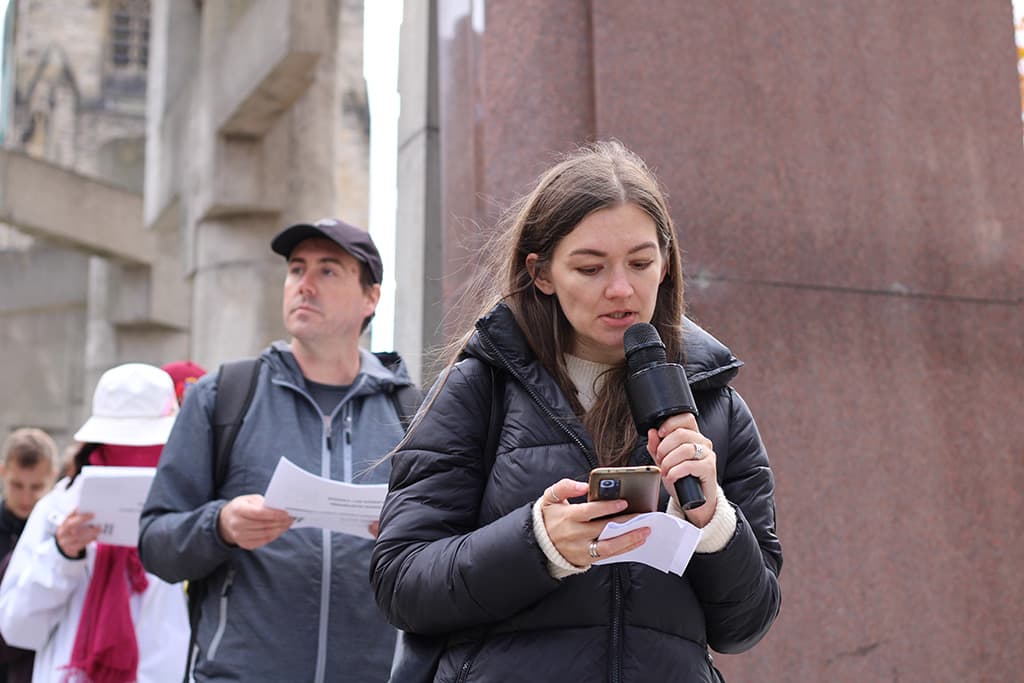From Stalin’s repression to the Communist club at Algonquin College

Anton Bogdanovich was born in 1889. He worked as a switchman at the Kalay railroad station in the Siberian city of Krasnoyarsk.
On May 17, 1938, he was arrested. On Oct. 15 that year, he was shot.
Eighty-five years later, on Oct. 27, 2023, his great-granddaughter, Polina Sysueva, read out his name on the pedestal of the Canadian Tribute to Human Rights in Ottawa.
Ottawa was one of the 88 cities in 35 countries that took part in the project called “Return of Names” honouring the millions who were unjustly executed in the former Soviet Union. Sysueva’s great-grandfather was one of the 33 names that were read out that day.

The event was organized by Memorial International, a Nobel Prize-winning human rights organization created in 1989 by the “Soviet Oppenheimer” or the “father of the hydrogen bomb,” Andrei Sakharov. He became the most prominent human rights advocate in Europe with the European Parliament issuing an annual human rights award in his name. The first award was given to Nelson Mandela in 1988.
So, Memorial International created a 12-hour-long stream that went live on Oct. 29, before the official Day of Remembrance. Hundreds of people around the world, one by one, read out the names of victims of political repression.
“It’s important to me to remember the past,” says Sysueva who moved from Russia in the fall of 2022. “I think the past gives us a lot. We need to take lessons from the past.”
At the same time, a very different organization is preparing its own rally. The Young Communist League of Canada is organizing an “All Out” protest for free post-secondary education on Nov. 8.
The League is represented at Algonquin College by the Young Communist Club and its leader, Robert Langille.
“We’re trying our best to agitate, educate, organize, (and) raise the class consciousness of the workers, of the people,” Langille says.

When Langille was 20, he used to play a video game with his dad. It was called Fallout, and it was about a post-apocalyptic world after the nuclear war between the United States and China. Naturally, the question of capitalism versus communism comes up.
“I asked my dad, what is communism?” Langille remembers. His dad told him to do his own research.
And he did.
It has been three years that Langille has been reading books by Marx, Engels, Lenin and Stalin.
He says that he wants to spend his entire life on “social and political change.” He is “willing to do that at whatever cost or sacrifice.”
But soon he corrects himself: “Maybe I shouldn’t use the word sacrifice. I should use the word devotion. I am willing to devote myself.”
Devoting himself to the ideology as a local club leader, Langille is a part of the larger League which was created 100 years ago in 1923.
The goal of the organization is to “defeat capitalism.” According to its website, it is an anti-racist, anti-sexist, anti-homophobic, anti-chauvinist, anti-transphobic and anti-ableism organization.
In February 2017, a political sciences student, Igor Sadikov, had to resign from the Students’ Society of McGill University.
“Punch a Zionist today,” he tweeted before his resignation on Feb. 6, 2017. He later deleted the tweet.
“It was interpreted as, you know, call to violence when obviously it was never intended to be that,” Sadikov says.
In 2020 Sadikov became the editor-in-chief of Rebel Youth Magazine published by the Young Communist League.
Anyone from any communist club around the country can contribute to the magazine. The League wants to have the sense that they are “speaking with the same voice and working toward the same goals,” Sadikov says.
The magazine has no editorial independence and is edited by the League’s leadership. So, the content must align with the organization’s ideology.
The contributors to Rebel Youth are often using terms like “NATO’s war against Russia via Ukraine” and “the ruling class media apparatus.” They refer to Joseph Stalin, the Soviet dictator responsible for the millions who were unjustly murdered and were later rehabilitated for the lack of evidence, as the “leader in the fight against the vanguard of imperialism” and they advocate “on behalf of the Eastern nationalities and oppressed peoples.”
“In some cases, they are full-blooded authoritarians loving a ‘strong man,’” Trevor Connolly says. He is an English tutor in Ottawa, and he was at the Canadian Tribute to Human Rights on Oct. 27.
“In other cases, I think there are people who see the wrongs of the West, of the U.S., of NATO, and they just assume because Russia and the Soviet Union opposed that, they must be good,” Connolly says. “But Russia is certainly not better, and the Soviet Union was not a paradise.”

“These are people who have never lived in the Soviet Union,” Vassili Kolomatski says. He moved to Ottawa in 1996. Before that, he lived in Soviet Ukraine and Russia. “They talk about their dreams and fantasies. They dream of free healthcare and education not understanding the reality of that life.”
The reality is that the main branch of Memorial International in Moscow was officially liquidated by the Moscow City Court on Dec. 29, 2021. It existed for 32 years (longer than the Russian Federation, which was formed in 1991).
It was banned along with hundreds of independent newspapers and human rights advocacy groups.
“Loss of historic memory always brings society downwards,” Kolomatski says. “Towards a new dictatorship, towards new executions.”








